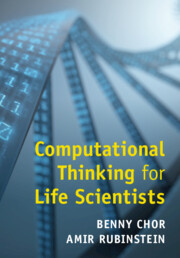
-
Select format
-
- Publisher:
- Cambridge University Press
- Publication date:
- 19 August 2022
- 08 September 2022
- ISBN:
- 9781108178327
- 9781107197244
- 9781316647592
- Dimensions:
- (247 x 174 mm)
- Weight & Pages:
- 0.56kg, 216 Pages
- Dimensions:
- (247 x 174 mm)
- Weight & Pages:
- 0.42kg, 216 Pages
You may already have access via personal or institutional login
Book description
Computational thinking is increasingly gaining importance in modern biology, due to the unprecedented scale at which data is nowadays produced. Bridging the cultural gap between the biological and computational sciences, this book serves as an accessible introduction to computational concepts for students in the life sciences. It focuses on teaching algorithmic and logical thinking, rather than just the use of existing bioinformatics tools or programming. Topics are presented from a biological point of view, to demonstrate how computational approaches can be used to solve problems in biology such as biological image processing, regulatory networks, and sequence analysis. The book contains a range of pedagogical features to aid understanding, including real-world examples, in-text exercises, end-of-chapter problems, colour-coded Python code, and 'code explained' boxes. User-friendly throughout, Computational Thinking for Life Scientists promotes the thinking skills and self-efficacy required for any modern biologist to adopt computational approaches in their research with confidence.
Reviews
‘An excellent and very gentle introduction to bioinformatics for biologists. In contrast to books that focus on algorithms and ignore programming or focus on programming without explaining algorithms, this book is a perfect blend of both algorithms and programming!’
Pavel Pevzner - Ronald R. Taylor Chair and Distinguished Professor of Computer Science, University of California at San Diego
‘The ability to extract quantitative information from data is an essential skill for the modern biologist. In order to maximize the benefit of programming, use of existing computational tools and effective collaboration with computational scientists, biologists must be able to ‘think computationally’ by gaining a more algorithmic and logical thinking. In their book, Benny Chor and Amir Rubinstein introduce fundamental computational concepts to life sciences students. Each chapter covers a distinct computational idea motivated by a concrete biological challenge. Questions embedded throughout each chapter and code examples provide hands-on practice. Similarly to the way in which chemistry is perceived as being essential to the biology curriculum, computational thinking should also be considered a part of the modern biologist's basic training. This excellent book is essential reading for undergraduate life sciences students.’
Assaf Zaritsky - Ben-Gurion University of the Negev, Israel
'… an excellent introduction to programming for scholars in the life sciences … This book provides a strong, domain-specific foundation and belongs in the library of any institution supporting instruction in the life sciences. … Highly recommended.'
J. Forrest Source: Choice
Contents
Metrics
Altmetric attention score
Full text views
Full text views help Loading metrics...
Loading metrics...
* Views captured on Cambridge Core between #date#. This data will be updated every 24 hours.
Usage data cannot currently be displayed.
Accessibility standard: Unknown
Why this information is here
This section outlines the accessibility features of this content - including support for screen readers, full keyboard navigation and high-contrast display options. This may not be relevant for you.
Accessibility Information
Accessibility compliance for the PDF of this book is currently unknown and may be updated in the future.

